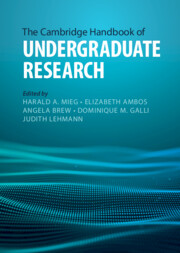Book contents
- The Cambridge Handbook of Undergraduate Research
- The Cambridge Handbook of Undergraduate Research
- Copyright page
- Contents
- Figures
- Tables
- Contributors
- Foreword
- Foreword
- 1 Introduction
- Part I Theory and Research on Undergraduate Research
- Part II Implementation, Approaches, Methods
- 7 Introduction
- Part II.1 Implementation Models in Undergraduate Research
- Part II.2 Key Measures for the Implementation of Undergraduate Research
- 13 Mentoring in Undergraduate Research
- 14 Inquiry Approach and Phases of Learning in Undergraduate Research
- 15 Assessment in Undergraduate Research
- 16 Dissemination in Undergraduate Research
- Part III Disciplines
- Part IV International Perspective
- Part V Avenues for Developing Undergraduate Research
- Index
- References
14 - Inquiry Approach and Phases of Learning in Undergraduate Research
from Part II.2 - Key Measures for the Implementation of Undergraduate Research
Published online by Cambridge University Press: 11 August 2022
- The Cambridge Handbook of Undergraduate Research
- The Cambridge Handbook of Undergraduate Research
- Copyright page
- Contents
- Figures
- Tables
- Contributors
- Foreword
- Foreword
- 1 Introduction
- Part I Theory and Research on Undergraduate Research
- Part II Implementation, Approaches, Methods
- 7 Introduction
- Part II.1 Implementation Models in Undergraduate Research
- Part II.2 Key Measures for the Implementation of Undergraduate Research
- 13 Mentoring in Undergraduate Research
- 14 Inquiry Approach and Phases of Learning in Undergraduate Research
- 15 Assessment in Undergraduate Research
- 16 Dissemination in Undergraduate Research
- Part III Disciplines
- Part IV International Perspective
- Part V Avenues for Developing Undergraduate Research
- Index
- References
Summary
The inquiry-based approach to learning has been successfully applied in science education. Inquiry-based learning is defined as an approach involving active, research-based learning in the classroom to acquire new knowledge and competences, either individually or collaboratively, in self-regulated learning settings. In this chapter five general inquiry phases are being discussed: Orientation, Conceptualization, Investigation, Conclusion, and Discussion. These phases and their corresponding sub-phases are interlinked in an inquiry cycle. While experiencing each phase the students will acquire research-based skills and further develop a wide range of soft skills as long as instructors provide adequate guidance and support.
Keywords
- Type
- Chapter
- Information
- The Cambridge Handbook of Undergraduate Research , pp. 149 - 157Publisher: Cambridge University PressPrint publication year: 2022
References
- 2
- Cited by

